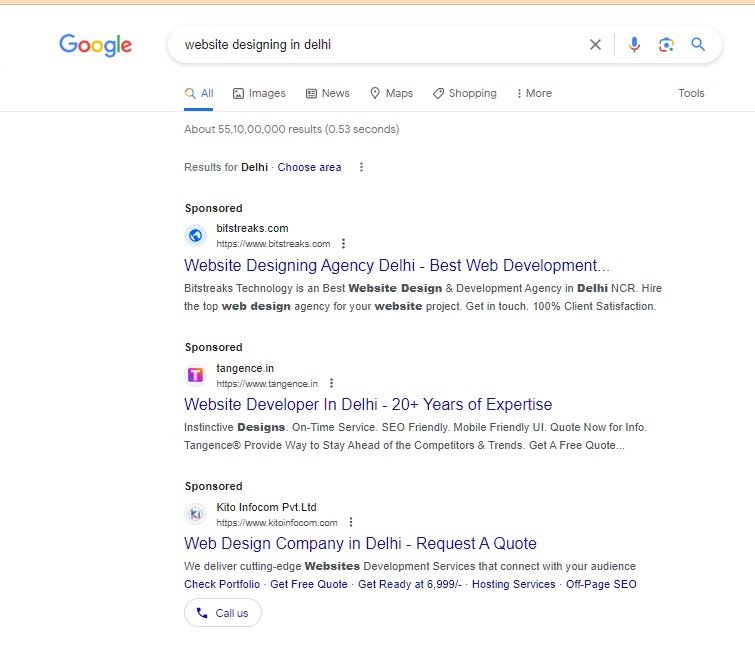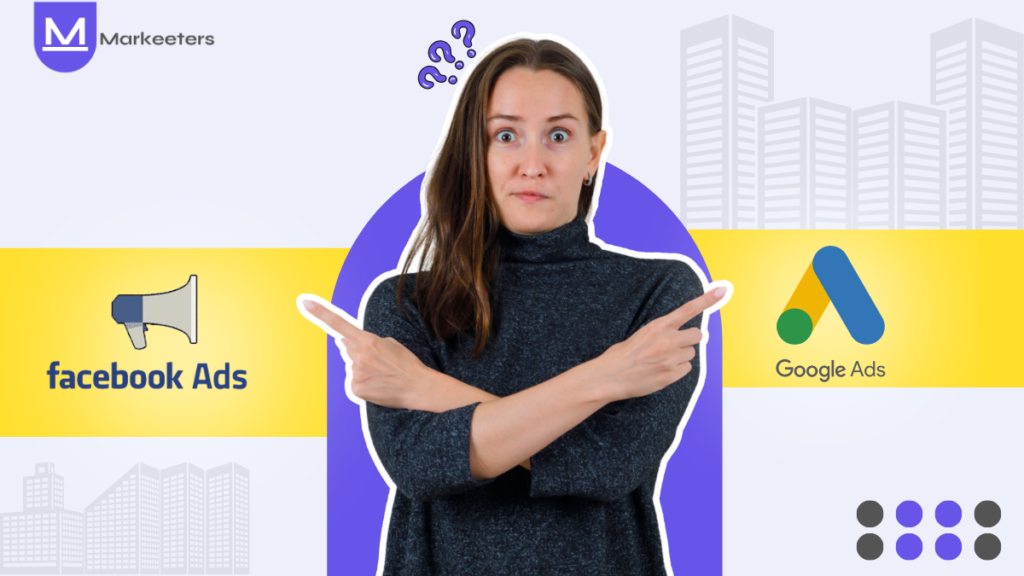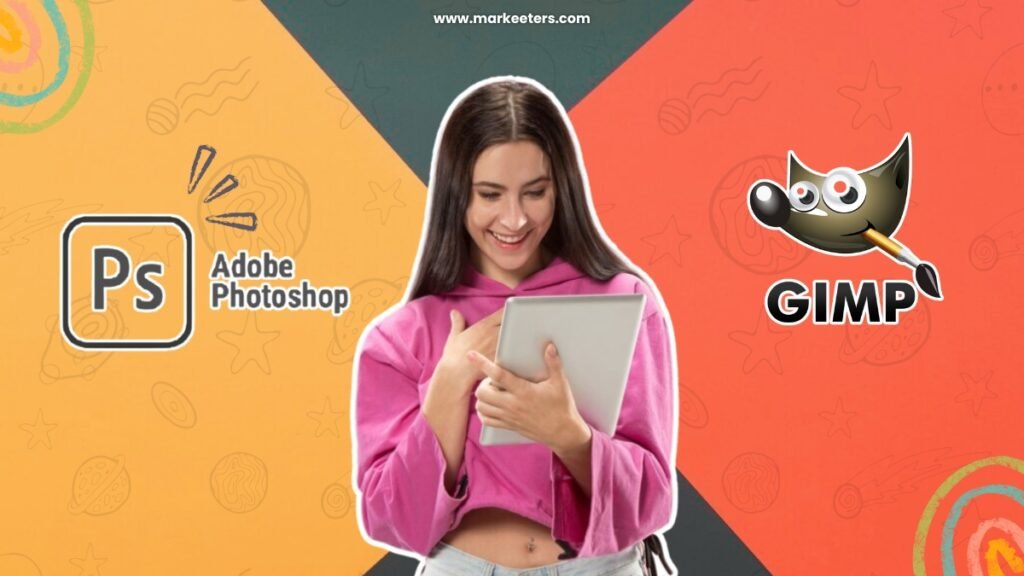Are you a business owner, then you must’ve probably thought about this question at one time or the other: Should you spend your advertising budget on Facebook ads or Google ads? The war is always on Google ads vs. Facebook ads. The answer is not that simple and requires a little understanding of which one is right for your business.
On the one hand, we have Google, which has become the preferred search engine for all your searches on the Internet. On the other hand, Facebook is a place where three-quarters of the world stays in touch with their friends. Both are equally important in the paid advertising space, but which one is right for your business depends on several factors.
Google Ads vs. Facebook Ads
| Feature/Aspect | Google Ads | Facebook Ads |
|---|---|---|
| Coverage/Reach | – Covers 90% of people online – 1 billion users on its search engine annually | – 2.2 billion people on Facebook |
| Market Share in Digital Ads | Google and Facebook together capture 60% | |
| Platform Appearance | – Google search results – Sites in Google advertising network | – Facebook – Other sites in Facebook’s network |
| Targeting Options | – Demographic – Behavioral – Keyword | – Demographic – Behavioral |
| Major Advantage | – Vast display network | – World’s largest social network |
While both platforms have massive reach and targeting capabilities, the major distinction lies in their primary functionalities: Google leans towards search and has the advantage of keyword targeting, whereas Facebook is a dominant social media platform, offering extensive reach within its social network. The choice between the two would often depend on the campaign goals, target audience, and specific advertising objectives.
Here are some things to think about before you pick one.
While Google ads appear in Google search results and on sites in the Google advertising network, Facebook ads appear on Facebook, Instagram, and other sites in the social media platform’s network. Both platforms offer demographic and behavioral targeting, although Google Ads also includes keyword targeting.
Also Read: Search Engine Marketing: Everything You Need to Know
How Detailed Should Your Targeting Be?
Facebook stores a mountain of data about its users. Although the social network has cut ties with external data collectors, it still allows advertisers to access a large amount of information about the audience, mainly provided by users. Google, on the other hand, shows ads that are relevant to the user based on queries and actions. There is no other service that stores customer data as well as Facebook does. Because of this, Facebook is the best place for advertisers whose goods might be about a certain event in a person’s life, like the birth of a child.

What You’re Advertising
Google has a lot of users and has been around longer, but Facebook has the best ads. The immersive Canvas (now called “Instant Experience”) format can turn a user’s screen into a showroom for a product. 360o video can turn a phone into a window to the world, and lead ads can get leads right from the platform. Because Facebook has interactive ad types, it’s a great place for businesses to promote stylish products or fun items that are easy to display visually.
There are a lot of different types of ads on Google, but they’re not nearly as interesting. Instead, if you want to be able to change how you advertise your goods, you should choose Google. For interaction, Facebook is the way to go. Allowing people to like, comment, and share your ads will help them reach more people if they have the potential to go popular. If it doesn’t, Google Ads might have a bigger following.

What Are the Good Things About Google Ads?
People think of Google as the undisputed leader in online advertising since it is the most famous and widely used search engine in the world. Being the site that answers more than 3.5 billion search queries every day, Google gives advertisers access to a huge pool of people who are constantly looking for goods and services.
When it comes to ads, Google has two main networks: the search network and the display network. Google as a search engine is part of the search network, and marketers can bid on millions of keywords and phrases to reach people who might be interested in buying something. The Google Display Network covers about 98% of the Internet and has more visual ads like banners. This makes it a great choice for advertisers who want to reach marketing goals that aren’t always as conversion-driven as PPC ads, like using banner ads to make a lot of people aware of their brand.
Also Read: What Is PPC? Basics of Pay-Per-Click Marketing
An Enormous Crowd
One of the best things about using Google for ads is that it reaches so many people. More than 40,000 search questions are sent to Google every second. That’s more than 1.2 trillion web searches every year. As Google gets smarter, in part because it relies more and more on RankBrain, its own artificial intelligence and machine learning technology, this huge number of searches is likely to keep going up, giving marketers more chances to reach new customers.
To put it simply, Google has the most possible users of any search engine. Google is a great tool for digital marketing because it gives you access to so many potential customers. But when you add in the fact that Google’s search results are getting more accurate, it’s easy to see why AdWords is the most famous and widely used PPC platform in the world.
An Even Playing Field
Many people who are new to pay-per-click (PPC) think that the person with the biggest advertising budget instantly “wins” at Google Ads. Google Ads cares more about the quality and relevance of ads than about how much money marketers spend.
The better the experience for the user, the more likely it is that they will keep using Google as their main search engine. More relevant ads are better experiences for users. Because of this, Google Ads puts quality and usefulness above all else. This is why smart advertisers with relevant, well-optimized, high-quality ads don’t have to bid as high as marketers with less-good ads—it’s a good investment.
It’s possible that some keywords cost more than others. For example, financial keywords are usually some of the most expensive in any professional field. However, how much advertisers have to bid will mostly depend on how good and relevant their ads are. Google checks the quality and usefulness of ads in a number of ways. One of the most important is the click-through rate, which is a good indicator of how appealing and quality an ad is overall.
A Lot of Different Types of Ads
Text-based ads that Google showed next to its search results when AdWords first started up in 2000 (with only 350 marketers) were, to say the least, very basic. However, they did have many of the same features as ads today.
Even though AdWords PPC ads are still text-based, marketers can use a huge range of features to make their ads more interesting and convincing to potential buyers. Marketers can use ad extensions, sitelinks, social proofing like user reviews, location targeting, shopping ads, and many other features. These give marketers a level of customization and control that has never been seen before.
Google has even created ad forms that are specifically designed to meet the needs of businesses like automakers and hotels. These formats are very different from the usual text-based ads because they include high-resolution images and interactive map data.
There’s probably an ad style or feature that will make your products or services more appealing to the people you want to buy them, no matter what you sell or who you sell them to. Google is always adding new ad formats and features that make it easier for businesses to reach new customers and make more money.
Also Read: 10 Types of Google Ads: Which One is Right for Your Business?
What Are the Advantages and Disadvantages of Facebook Ads?
| Advantages | Disadvantages |
|---|---|
| Huge Audience: Over 1.55 billion users. | Changing Rules: Facebook changes its ad rules. |
| Targeted Ads: Can show ads to specific people. | Trust Issues: Some users don’t trust Facebook ads. |
| Find Similar Users: Matches ads with users like your customers. | Too Many Ads: Risk of users seeing too many ads. |
| Works Well: Effective in reaching the right users. | |
| Looks Good: Ads blend with other content. | |
| Good Profit: High returns at a low cost. | |
| Cheap: Affordable for small businesses. |
Also Read: How to Build Customer Relationships with Social Media?
Which Should You Use: Google Ads vs. Facebook Ads?
Google Ads and Facebook Ads are both very powerful advertising tools that can be used by almost any kind of business. When looking at the pros and cons of each option and the ways it could be used, it’s also clear that the two platforms should be seen as working together, not against each other. Some people keep saying that Facebook Ads are the same as the Google Display Network. There are some links between the two, but the fact that they have grown and changed separately shows that Google and Facebook should be used together, not against each other.
Using the power of both paid search and paid social is a very effective way to advertise. However, it requires a two-pronged approach to advertising that plays to the strengths of each site. For the best return on investment (ROI) and business growth, it’s important to know how to use both Google Ads and Facebook Ads. Marketing messages can and should stay the same across both platforms.
Managing ad campaigns can often be intricate, demanding meticulous attention to detail, constant optimization, and an in-depth understanding of evolving ad platforms. By hiring a paid ad expert from Markeeters, you can streamline this process substantially. These experts possess a wealth of experience in strategizing, executing, and refining advertising campaigns across various platforms.
They’re not only familiar with the nuances of ad targeting, A/B testing, and conversion tracking, but they also keep abreast of the latest trends and platform changes. This ensures that your campaigns remain competitive, cost-efficient, and in line with your business goals. With a Markeeters professional handling your campaigns, you can focus on other core aspects of your business, confident that your advertising efforts are in capable hands.
Also Read: How to Build Customer Relationships with Social Media?
Frequently Asked Questions
Should I use Google ads to promote my business?
Yes, Google Ads can effectively increase your company’s visibility because it reach a large audience through intent-based targeting. It’s inexpensive since you pay per click, and it produces immediate results. However, success necessitates a deliberate approach as well as constant optimization.
Do Facebook ads perform better over time?
Yes, Facebook ads can improve over time as advertisers optimize campaigns using gathered data. However, regular adjustments are vital due to changing market dynamics and audience behaviors.
Which is better Google ads or Facebook ads?
Google Ads and Facebook Ads serve different purposes: Google targets users actively searching for products or information, while Facebook targets them based on interests and demographics. Google might be more expensive but captures high intent, whereas Facebook is great for brand awareness and might be more budget-friendly. The best choice depends on your specific goals and target audience.





